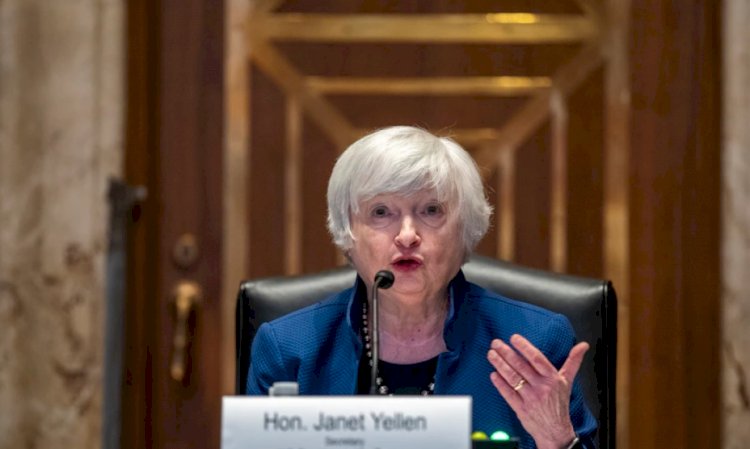White House Celebrates Major Agreement on Global Business Taxes
US leadership key to deal

White House Celebrates Major Agreement on Global Business Taxes
WASHINGTON - The Biden administration has congratulated itself on what Treasury Secretary Janet Yellen called a historic piece of “economic diplomacy,” after 130 countries representing 90% of global GDP agreed in principle on a global minimum tax rate on corporations.
The agreement, whose signatories included China, Russia, India, and every member of the G-20, agreed to impose a minimum tax of at least 15% on corporations in an effort aimed at preventing what Yellen has frequently called a “race to the bottom” between countries trying to lure companies to their shores by dangling low tax rates.
“No nation has won this race,” Yellen said in a statement issued Thursday. “Lower tax rates have not only failed to attract new businesses, they have also deprived countries of funding for important investments like infrastructure, education, and efforts to combat the pandemic. In the United States, this agreement will ensure that corporations shoulder a fair share of that burden.”
US leadership key to deal
The Organization for Economic Cooperation and Development (OECD) has been fighting since 2013 to come to some sort of arrangement that would rationalize the tax treatment of global corporations throughout the world. The aim has always been to capture the hundreds of billions of dollars in tax revenue that experts say governments lose each year to corporate tax avoidance strategies.
But the project had ground nearly to a halt over the previous few years.
“It's absolutely fair to say the Biden administration pushed it over the line,” said Daniel Bunn, vice president of global projects at the Tax Foundation, a conservative-leaning think tank in Washington.
“This time last year, things were essentially at a stalemate,” he said. The Trump administration wasn’t fully on board with the plan to institute a global minimum tax. But, he said, “The Biden administration picked it up and really threw a lot of political capital into it to convince other countries that they needed to sign on to it.”
What the deal does
While a lot of details remain to be negotiated, the basic idea behind the agreement is that companies should be required to pay at least some taxes on profits in the countries where their products and services are consumed, rather than allocating all of their profits to entities headquartered in tax haven countries.
The proposal would implement a system for allocating a share of taxable profits to individual countries where a company’s goods or services are purchased, and then mandate a tax rate of at least 15% on those profits.
Further, to the extent that there are jurisdictions that choose to apply a lower rate and businesses that elect to move some operations to those countries, the proposal would allow their home countries to charge additional taxes that bring the balance to 15%.
The object is to make it difficult or impossible for countries to influence companies’ decisions about where to locate headquarters and operations using reduced tax rates as bait. The idea is that if there is no tax advantage to be gained by moving to a specific country, such decisions will be made on the basis of business needs rather than tax rates.
Premature celebration?
During a briefing at the White House on Friday, Brian Deese, the director of the National Economic Council, tied the agreement to an effort by the Biden administration to increase the corporate tax rate and implement other reforms.
The OECD agreement, he said, creates “momentum to enact a corporate tax reform in the United States that would not only help to improve U.S. competitiveness by making it more attractive to invest here in the United States rather than investing in shifting production and profits to low tax jurisdictions, but also raise revenue that we can invest in productivity enhancing measures like universal preschool.”
While the White House was quick to tout the agreement reached Thursday as a major triumph, there are those who are less sanguine about the way the agreement will fare when it comes time to actually implement it.
Other challenges
“The big obstacle, which was not much noted in the press reports I saw, is the very, very fundamental fact that national legislatures in democratic countries regard themselves as responsible for writing tax laws,“ said Gary Hufbauer, a senior fellow at the Peterson Institute for International Economics who previously held senior roles related to international taxation at the Treasury Department.
In the U.S. in particular, he said, “The Senate Finance Committee, the House Ways and Means Committee, and the rest of the congressmen and senators, they really think they write the tax laws and they are not going to salute whatever Secretary Yellen has agreed to.”
That applies at the level of the European Union, where all tax laws that apply EU-wide have to be agreed upon unanimously. Several members of the EU, including Ireland, Hungary, Estonia, and Cyprus, did not sign on to the agreement announced this week, and might not agree to participate in the future.
Other experts were less concerned about the rules being diluted by national legislatures.
“No matter what the OECD comes up with, there's bound to be quite a bit of tinkering,” said Thornton Matheson, a senior fellow at the Urban-Brookings Tax Policy Center. “When this passes in the actual national legislatures, as long as the strokes are there, there can be tinkering.”
VOA








































